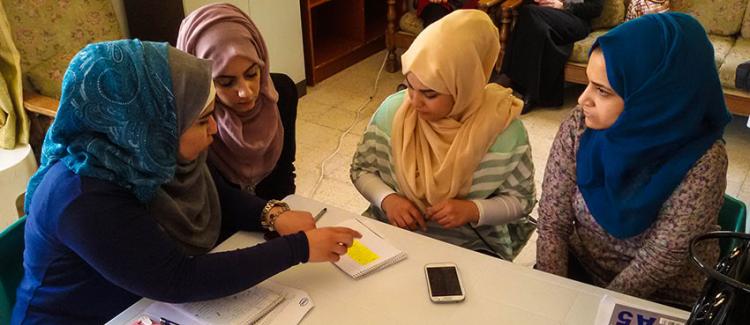Development Challenge
One of our main objectives is to improve local economic development (LED) in certain underserved areas across the kingdom to achieve broad-based economic growth for Jordan. Working with municipalities is vital to achieving this goal, because municipalities must able to create an environment conducive to business creation and economic growth in their communities.
Specifically, USAID LENS works with the governorate Local Development Units (GLDUs) and municipal Local Development Units (MLDUs) in the three governorates that have the highest concentration of businesses in Jordan: Irbid, Zarqa and Amman. These entities are responsible for engaging with the private sector in order to mobilize resources and encourage growth at the municipal level. To do this, they must have a solid foundation for local economic development.
USAID LENS Work
In June 2014, 9 municipalities in Zarqa, Irbid and Amman governorates were selected through a competitive process to partner with USAID LENS to promote economic growth in their communities through their municipal local development units (MLDUs). The municipalities are: Azraq, Hashmeyeh and Greater Zarqa in Zarqa Governorate; Tabaqet Fahel, Muath Bin Jabal, Shou'la and Mazar in Irbid Governorate; and Na'ur and Amreyya in Amman Governorate.
The participating municipalities were selected through a competitive application process based on five criteria: community socio-economic status; potential for robust growth of MSEs within the community; municipality willingness to contribute human, financial and material resources to advance economic growth; demonstrated commitment to cooperation and engagement; and alignment with Jordan's national socio-economic development priorities.
USAID LENS works with its partnering MLDUs and GLDUs to ensure that they are well-equipped with the necessary tools and knowledge to carry out local economic development in their communities through:
- Having a vision for growth and developing strategic priorities through LED plans
- Knowledgeable staff with clear job responsibilities
- Understanding relevant legislation and policies
- Mobilizing strategic partnerships with the private sector and investors
- Knowing how to access and use alternative financing mechanisms
- Identifying local assets (human, natural, financial and other resources) that could support LED
- Regular access to and ability to use data and information regarding the potential sources of growth
The main activities that USAID LENS carries out to encourage local economic development include:
- Municipal Resource Mapping: We are supporting the municipalities to develop systems to collect and use data so that they will have a regular and up-to-date source of useful information.
- Local Economic Development Plans: We are helping each partner municipality to develop a comprehensive LED plan. This involves training them to think strategically, create an economic development vision for their city and build the capacity of local staff to implement this vision. The LED plans for partner municipalities will be completed by first quarter of 2016.
- MLDUs Support Package: The support package consists of: training sessions, basic equipment, modest office renovations, communications support and facilitating public-private dialogues.
- Thematic Workshops: Workshops for the project’s partners (GLDUs, MLDUs, MSEs, BSPs, key ministries, etc.) that focus on different themes such as PPP, gender mainstreaming, outcomes of value chain analysis, investment promotion.
- Value Chain Strengthening: As part of our value chain work, we are engaging municipalities and LDUs as relevant stakeholders to find out more about business environments, investment, and other issues in local communities.
- Local Economic Development Initiatives: USAID LENS will support LED initiatives that address a particular problem or opportunity associated with economic growth. They will be designed based on the LED plans of the partner municipalities.
- Public Private Dialogues (PPDs): USAID LENS is facilitating PPDs in partner municipalities to be oriented around very specific goals and issues. We are also guiding municipalities in how to sustain and create linkages beyond the life of the project.
- Grants: Over the course of the project, USAID LENS will offer different types of grants designed to support and promote economic growth and job creation among MSEs within targeted sectors and geographic areas, including within our partner municipalities.
- LDU Assessment Tool: For monitoring and evaluation purposes, USAID LENS designed a tool to measure the capacity of municipalities and MLDUs to lead and implement local economic development (LED).
Main Achievements
- Institutional-strengthening activities for 12 MLDUs and GLDUs, including technical assistance in economic development planning and equipment/office upgrades totaling close to $500,000.
- Conducted workshops on LED planning for each partner municipality in October and November 2015. These workshops involved key stakeholders from the local community to plan a long-term strategy for each municipality’s local economic development. Complete LED plans will be ready by first quarter of 2016.
- Supported the training of 645 individuals (463 men; 182 women) in 2015 focused on raising the LDUs staff and key stakeholders capacity on LED and MSE specific themes, including a workshop on the proposed public-private partnerships (PPP) law.
- Completed LDU assessments in 2015 to measure their current capacity and provide a benchmark for USAID LENS LED activities.
- Funded a workshop for MLDU and GLDU employees on project management in December 2015 to help them increase their skills in this managing LED projects. This workshop qualifies them to attain the world-renowned and recognized PMP certification.
-
USAID LENS is organizing a series of MSE Festivals in partner municipalities and governorates to increase the engagement of the LDUs with MSEs in their community. These festivals are structured as one-day or half-day events that will feature delivery of the MSE Toolkit content developed by LENS through training sessions, and will include the participation of NGOs and CBOs to promote the services they can provide to MSEs. Through these events, the LDUs will serve as a resource to MSEs in their community, with the possibility of follow on activities and training events supported by LENS but led by the LDUs.




